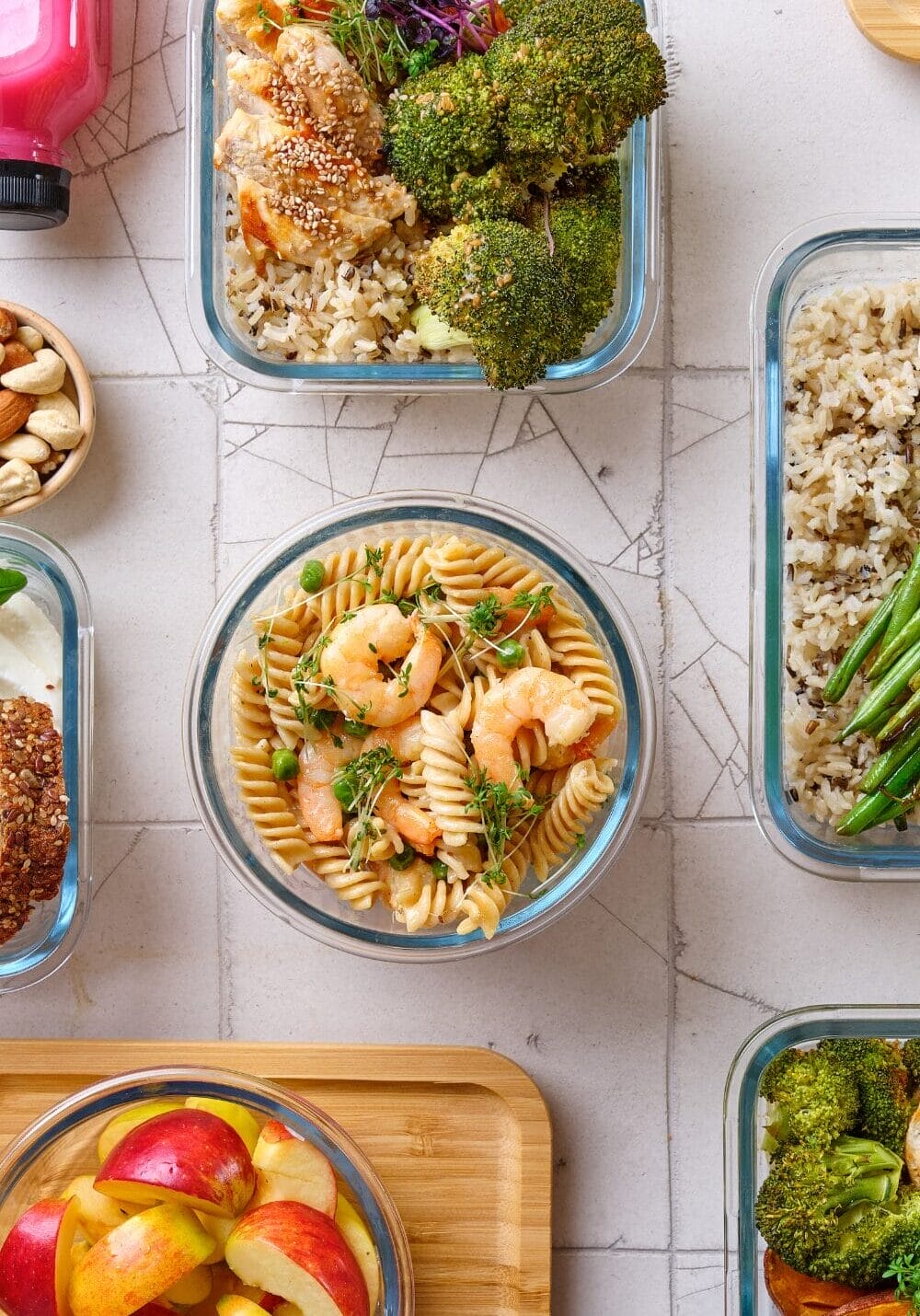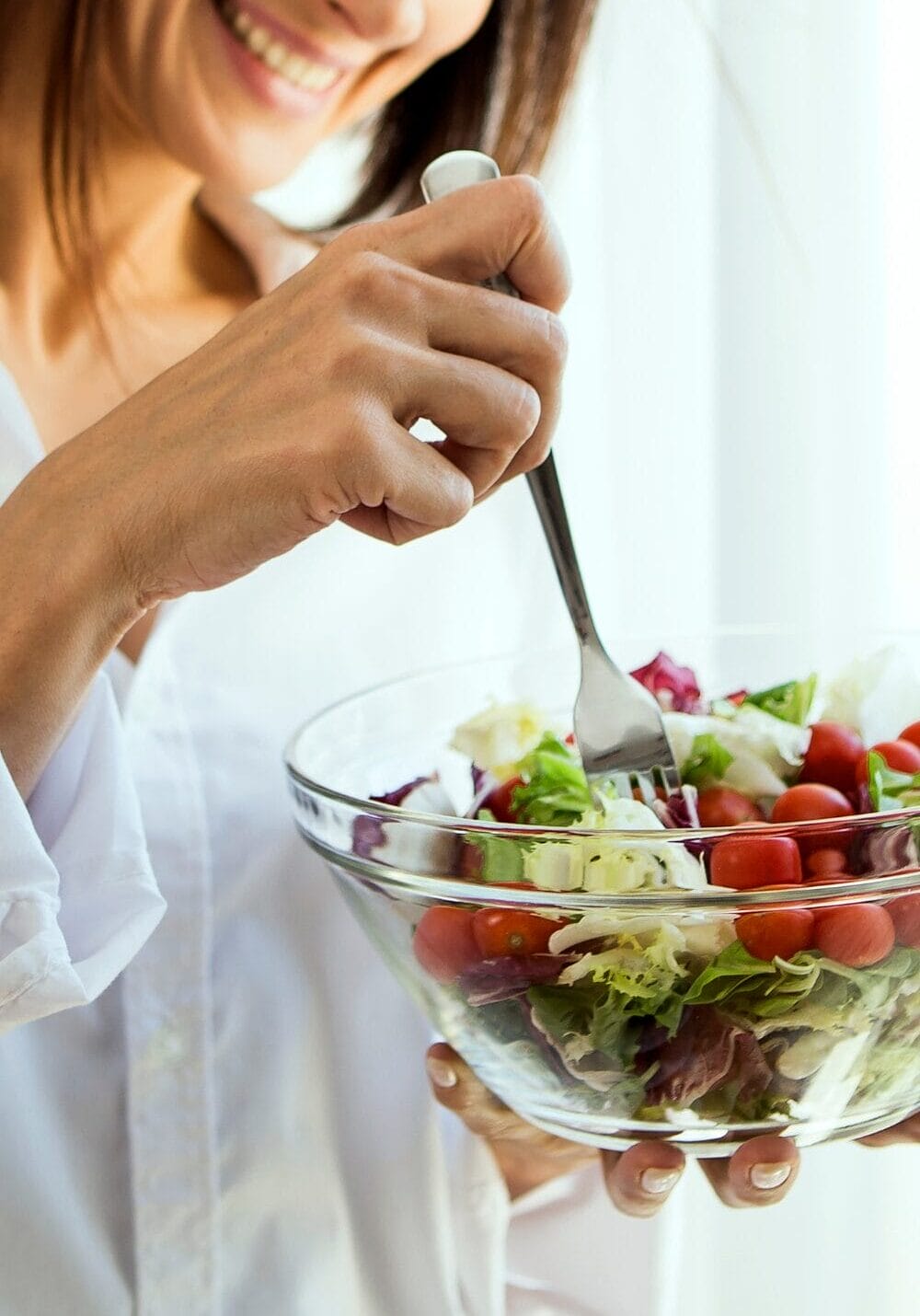As we age, our bodies go through several changes, including menopause, greying hair and reduced skin elasticity. However, these can all be supported by following a balanced nutritious diet.
The key thing is knowing what to eat, as well as when and how often. Your diet in your 50s and 60s is very different to your 20s and 30s , for instance. So it’s important to be adaptable and tailor what you eat towards your unique needs.
At The McIndoe Centre, we understand just how crucial adopting healthy eating habits is in your 50s and 60s. That’s why we’ve compiled this guide to delve into the nuances of healthy eating for those over 50, offering deep insights into the changes you can make to support your health.
Nutritional needs in later life
As we age, our bodies go through a variety of natural processes that influence and change our nutritional needs. Understanding what these changes are and how they impact your health and diet can help you make the right choices for your body.
Metabolism (how your body changes food into energy) usually slows down when you get older which means you may need to adjust how many calories you eat per day.
However, determining the right number of calories for your body will depend on several factors, including how active you are and your overall health.
If you need to reduce your calorie intake, for example, you will need to prioritise nutrient-dense foods moving forward to ensure you can still reach your nutritional goals.
What makes up a healthy diet?
While many different nutritional parts make up a healthy diet, what form these take and how much you need can change after you turn 50.
Foods to incorporate into your diet
There are lots of healthy foods you should incorporate into your diet such as:
- Fresh fruits and vegetables – these contain a range of nutrients your body needs to function and remain healthy as you get older.
- Foods low in saturated fats – eating too much saturated fat may increase your risk of high cholesterol levels, heart disease and stroke. Vegetables, low-fat dairy options and lean cuts of meat are all low in saturated fat and easy to add to your diet.
- Dairy or fortified dairy alternatives – these provide you with vitamin D and calcium, both of which are essential for bone strength and health. Women going through menopause have low levels of oestrogen which can lead to osteoporosis (weakened bones). This is why getting enough vitamin D and calcium is essential when over 50. Choose low-fat dairy foods or dairy alternatives fortified with added vitamins and minerals to ensure you don’t have too much fat in your diet.
- Whole grains like brown rice, wholemeal bread and quinoa – whole grains have a low glycaemic index (GI), a rating system that shows how fast your blood sugar is affected by certain foods. Whole grains help keep your blood sugar stable and increase slowly.
- Protein – try not to eat too much red meat as this may increase your risk of heart disease and colorectal cancer. Opt for lean proteins or plant-based alternatives.
Foods to avoid
Eating a well-balanced diet is important but there are some types of foods you should try and limit in your diet.
Try to avoid foods that are:
- High in sugar (ice cream, pastries and chocolate)
- Highly processed (bacon, sausages and deli meats)
- High in saturated fats (butter, hard cheeses like cheddar and pastries)
Thinking about the types of foods you do and do not eat can help reduce your risk of common health conditions in older people such as high cholesterol, type 2 diabetes and heart disease.
Meal planning and preparation tips
Planning your meals is a brilliant way of ensuring you meet your nutritional needs and continue to meet them as they change with age. Each week, outline your meals and make sure to include a good balance of protein, carbohydrates, healthy fats and plenty of fruits and vegetables.
Keeping your diet diverse not only provides you with a complete range of nutrients but also prevents you from getting bored with your meals.
Batch cooking is a top tip when trying to maintain nutrition with age. It also requires less effort throughout the week, giving you more free time to do the things you love. Soups and stews are perfect for batch cooking. But really, any meal can be made in large quantities and chilled or frozen for later.
If you don’t want to batch cook or perhaps don’t enjoy cooking from scratch, buy pre-prepared foods that are healthy. Pre-cut, tinned and frozen vegetables can cut down preparation and cooking time, allowing you to still eat nutritious meals without spending hours cooking.

However, as well as what you cook, how you cook is just as important. The way you cook food can change its nutritional value, something which you want to be mindful of as you get older.
For instance, instead of frying food, try steaming, baking or grilling it. This retains more nutrients and minimises the need for excess oils.
Meal planning and preparation tips
Planning your meals is a brilliant way of ensuring you meet your nutritional needs and continue to meet them as they change with age. Each week, outline your meals and make sure to include a good balance of protein, carbohydrates, healthy fats and plenty of fruits and vegetables.
Keeping your diet diverse not only provides you with a complete range of nutrients but also prevents you from getting bored with your meals.
Batch cooking is a top tip when trying to maintain nutrition with age. It also requires less effort throughout the week, giving you more free time to do the things you love. Soups and stews are perfect for batch cooking. But really, any meal can be made in large quantities and chilled or frozen for later.
If you don’t want to batch cook or perhaps don’t enjoy cooking from scratch, buy pre-prepared foods that are healthy. Pre-cut, tinned and frozen vegetables can cut down preparation and cooking time, allowing you to still eat nutritious meals without spending hours cooking.
However, as well as what you cook, how you cook is just as important. The way you cook food can change its nutritional value, something which you want to be mindful of as you get older.
For instance, instead of frying food, try steaming, baking or grilling it. This retains more nutrients and minimises the need for excess oils.
Special considerations and dietary restrictions
When you get older, you may have to adjust to special considerations or dietary restrictions for several reasons. Certain health conditions like diabetes, high blood pressure or high cholesterol can mean you need to be more mindful of your food choices.
High sodium (salt) can play a role in the development of high blood pressure, heart disease and stroke, so paying close attention to how much is in your food is essential.
Your digestive health and needs may change as well. While constipation and diarrhoea are common problems to experience, they can often be resolved through dietary changes.
Eating enough fibre, for example, can help promote healthy digestion, while cutting diarrhoea-triggering foods, like the lactose contained in dairy products, can also make a big difference.
Some medications may interact with certain foods or drinks, so you’ll need to pay close attention to anything your doctor advises you to avoid.
One common restriction is alcohol as it may interact with certain medications and make them less effective. However, if you’re ever unsure about what you should avoid when taking medication, always consult your doctor.

Staying active and hydrated
Staying active in your 50s and 60s is not only possible but it’s also incredibly important for supporting your health and wellbeing as you age.
The key thing is to try and find activities you enjoy and that suit your abilities. Low-impact options like swimming, yoga and cycling can all be gentle on your joints while still helping you maintain muscle mass and strength.
Staying consistent is also essential. Make sure you exercise for around 150 minutes per week, or 30 minutes a day, five days a week.
Hydration is also an important component of your health and, if you’re exercising regularly, you will need to replenish any lost fluids. Drinking enough water supports your cognitive function, digestive health and all kinds of other bodily functions.
To ensure you drink enough, set yourself hydration goals each day and try your best to hit them.
Checking the colour of your urine can be a good indicator of how hydrated you are. Ideally, urine should be pale yellow so if it’s darker than this, it could be your body’s way of telling you to increase your fluid intake.
FAQs about healthy eating in your 50s and 60s
With so much information and advice available, it can be hard to know which foods you need to actually prioritise or avoid as you age. To help, we’ve collated some of the most commonly asked questions about healthy eating in your 50s and 60s.
Healthy eating in your 50s and 60s isn’t just about the present. Eating well now and maintaining a well-balanced diet over the long term can support your future health and set your body up for further changes and challenges as you carry on ageing.

In your 50s and 60s, each meal represents an opportunity to invest in your health and ensure you support it for as long as possible. Maintaining a well-balanced diet may reduce your risk of certain health conditions like type 2 diabetes and heart disease but it’s important to consider all the factors that could influence your risk, including genetics.
While learning to eat for your health can be done at any age, it’s especially important as you get older. So take the time to carefully plan your food and put the effort into its preparation.
FAQs about healthy eating in your 50s and 60s
With so much information and advice available, it can be hard to know which foods you need to actually prioritise or avoid as you age. To help, we’ve collated some of the most commonly asked questions about healthy eating in your 50s and 60s.
Healthy eating in your 50s and 60s isn’t just about the present. Eating well now and maintaining a well-balanced diet over the long term can support your future health and set your body up for further changes and challenges as you carry on ageing.
In your 50s and 60s, each meal represents an opportunity to invest in your health and ensure you support it for as long as possible. Maintaining a well-balanced diet may reduce your risk of certain health conditions like type 2 diabetes and heart disease but it’s important to consider all the factors that could influence your risk, including genetics.
While learning to eat for your health can be done at any age, it’s especially important as you get older. So take the time to carefully plan your food and put the effort into its preparation.
News and articles
We offer a range of news and blog articles to enable people to make more informed decisions when it comes to the treatments we have at The McIndoe Centre.





